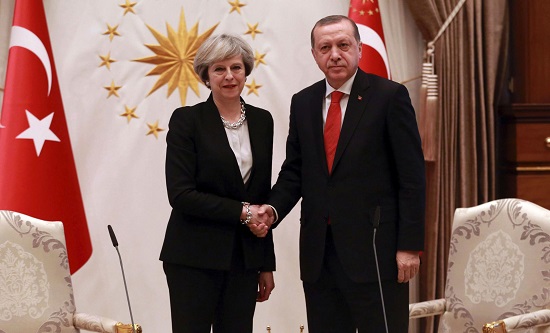
President Erdogan called snap parliamentary and presidential elections for 24 June 2018, nearly 18 months ahead of schedule. He intended to benefit from a surge in chauvinist sentiment following the capture of Afrin in northern Syria from the Kurds in March. Erdogan also sought to pre-empt the economic and political crisis converging on Turkey that will erase the electoral support that has kept his Justice and Development Party (AKP) in power since 2002. He may be too late.
During his electoral campaign Erdogan visited Britain from 13 to 15 May. He began his visit with a meeting near Reading, hosted by BAE Systems and BP. BAE Systems has a contract worth £100m to develop fighter jets for the Turkish Air Force. Rolls Royce is looking to provide engines for the planes. Unusually, the British government has agreed to waive export controls so that Turkey can sell the jet to any country it chooses. British Prime Minister Theresa May expressed her support for Turkey and said that Erdogan was trying to defend his country from ‘the extraordinary pressures of a failed coup and Kurdish terrorism’. This designation of ‘Kurdish terrorism’ is exactly the formulation that Erdogan uses to legitimate Turkey’s war on Kurds in Turkey, Syria and Iraq. In Turkey, some 140,000 people have been arrested, many of them imprisoned, 152,000 have been sacked and over 160 journalists have been imprisoned, all for allegedly supporting ‘terrorism’. This repression is what Theresa May endorsed. Erdogan described Britain ‘as an ally and a strategic partner, but also a real friend…the cooperation we have is well beyond any mechanism we have established with other partners’. When Kurdish people and their supporters protested outside Downing Street they were attacked with police dogs and horses and people. The Metropolitan Police brought Turkey’s war to the streets of London.
However, President Erdogan received a less welcoming embrace from the City of London. On 14 May he told a meeting of investors that as the head of state he would take responsibility for Turkey’s monetary policy, explaining ‘When people fall into difficulties due to monetary policies, who will they hold accountable? They’ll hold the President accountable. We have to give off the image of a president who is influential on monetary policy.’ Earlier in the day, Erdogan told a meeting at the Royal Institute of International Affairs in London to ‘please learn’ that low interest rates deliver low inflation. This was when the Turkish lira was tumbling against other currencies and investors were crying out for an interest rate rise to stop the fall. The Financial Times recorded those present as saying Erdogan’s remarks were ‘astonishing’; one of those present said ‘When you hear things like that, you really start to wonder’. ‘There’s no hope now. It sounds like he doesn’t listen to any one any more,’ commented another, (16 May 2018). The lira promptly fell to a record low. As one Turkish official put it, ‘His advisers are a bunch of idiots and sycophants.’ Unperturbed by the lira’s constant decline, high interest rates, Erdogan insisted, are ‘the mother and father of all evil’. On 23 May the lira fell 5% in a day; it had fallen 17.6% against the US dollar in the month. Whatever, Erdogan may do with journalists and political opponents he could not do to the exchange markets: on 23 May Turkey’s central bank raised interest rates by 3%. This may be too little and too late.
Turkey’s short term debt, most of it held by companies and in foreign currencies, stood at $181bn in March 2018; about 20% of Turkey’s GDP. Inflation was at 10.85%, but oil prices had risen 40% in the two months to mid-May; Turkey is dependent on imported oil and oil is priced in dollars. Unemployment is 11% and 21% for youths. Improved living conditions, which helped secure Erdogan and the AKP support from sections of the population, are going into reverse.
The elections are held under a state of emergency that curbs public gatherings and freedom of expression. Erdogan has reinstated the rule which allows unstamped ballots to be counted, following their inclusion in the April 2017 constitutional referendum. A new rule has been introduced, that allows parties that do not exceed the 10% threshold to take seats in parliament if they are part of electoral alliance. This was done to allow the AKP to form a coalition with the Nationalist Action Party (MHP), if required. The Peoples’ Democratic Party (HDP) presidential candidate, Selahattin Demirtas, is in prison, along with nine fellow HDP MPs, including co-chair Figen Yuksegdag. The HDP is not part of any electoral alliance. However, the Republican People’s Party (CHP), the new Iyi (Good) party and two other parties are in a coalition and this may affect the AKP’s performance in the parliamentary election. The AKP government has introduced a 50% threshold for the presidential election; any candidate needs 50% or more of the vote to avoid a runoff with a rival candidate. This time Erdogan may find that, as with the exchange markets, the tide has turned against him. He may be able to rig the votes, but he will be under siege in his presidential palace, with idiots and sycophants, and the British government, for allies.
Boycott tourism in Turkey!




